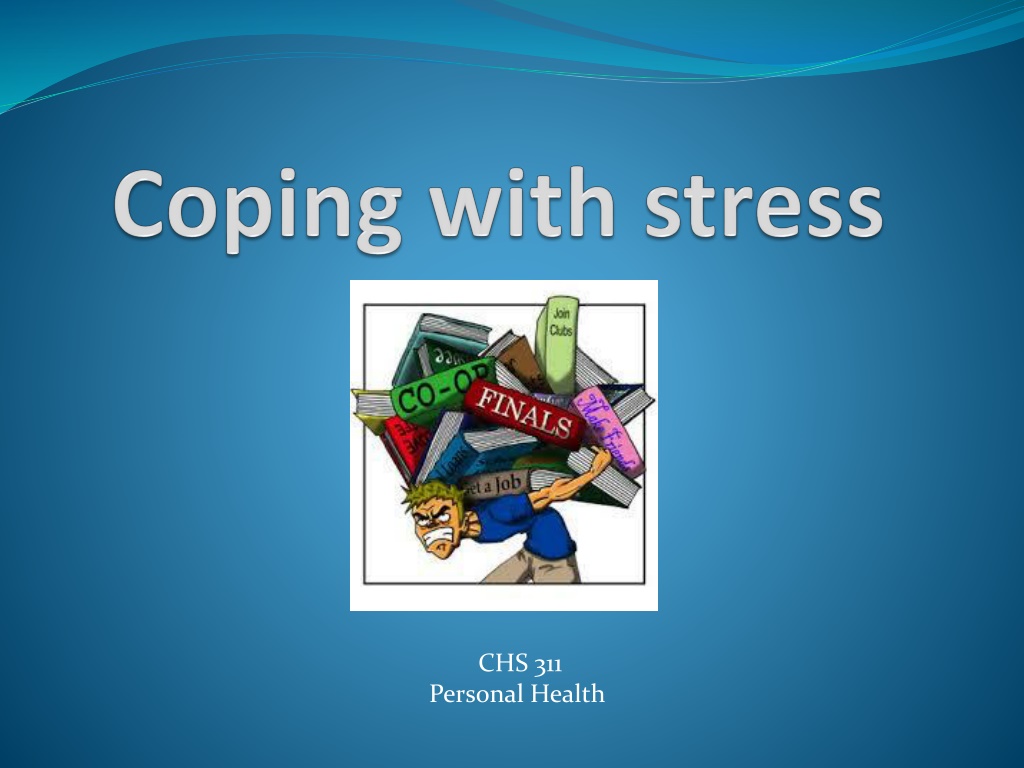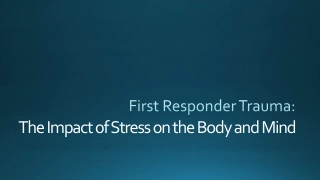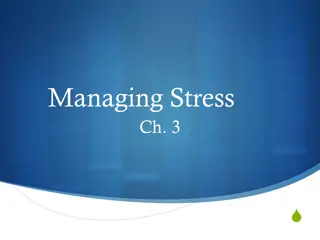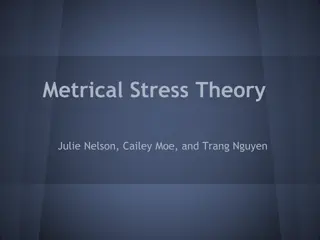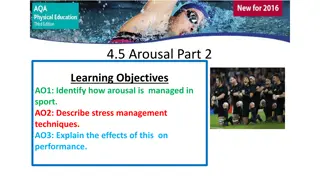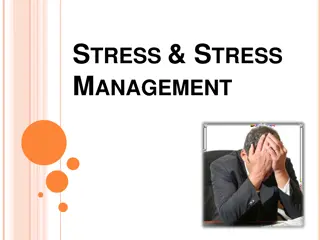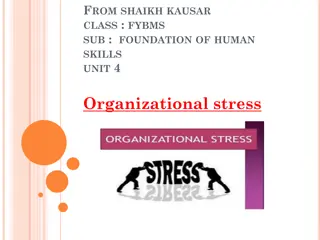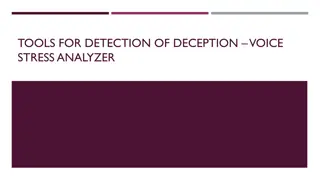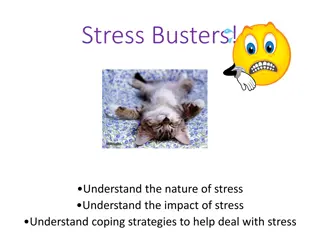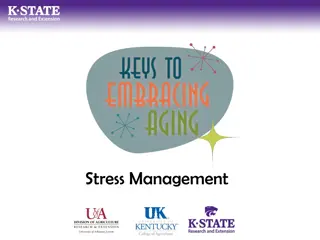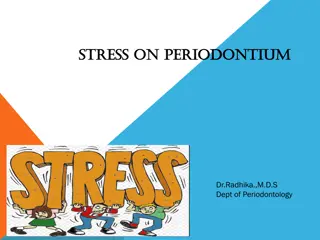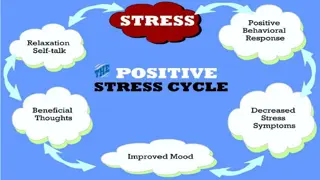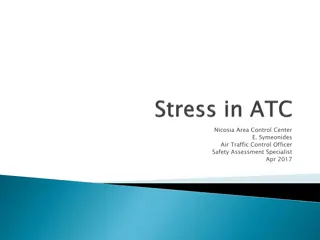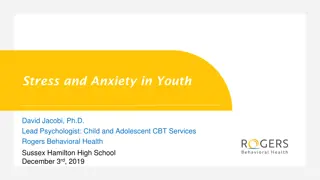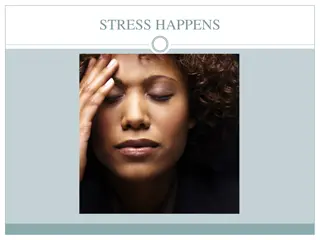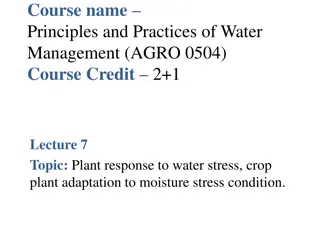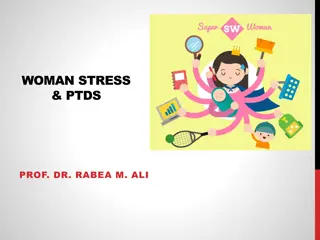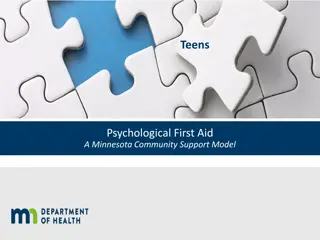Understanding Stress: Causes, Effects, and Management
Stress is the body's response to demands, events, or stimuli that exceed individual adaptive resources. It can have negative effects on physical and emotional well-being, leading to symptoms like weight changes, heart palpitations, and mood swings. However, not all stress is harmful; positive stress can motivate and enhance performance. Managing stress involves identifying stressors, employing coping strategies, and practicing relaxation techniques. Recognizing the impact of stress on the body is crucial for maintaining overall health and well-being.
Download Presentation

Please find below an Image/Link to download the presentation.
The content on the website is provided AS IS for your information and personal use only. It may not be sold, licensed, or shared on other websites without obtaining consent from the author. Download presentation by click this link. If you encounter any issues during the download, it is possible that the publisher has removed the file from their server.
E N D
Presentation Transcript
CHS 311 Personal Health
Outline: What is stress? Stressors, and examples of such. How the body react to stressors? Negative and positive effect of stress. Stress management. Coping strategies. Relaxation techniques.
What is stress? Any stimulus, event or demand impacting on the sensory nervous system . Stress is the body s automatic response to any physical or mental demand placed on it . Events (environmental or internal) that tax or exceed the adaptive resources of the individual Adrenaline is a chemical naturally produced in our body as a response to stress .
Most common life stressors Major life events such as loss of a loved one or divorce. Trauma such as sexual abuse and earthquakes. Socio-economic stressors such as malnutrition and poverty. Social stressors such as relationship issues, family changes, sexuality, loneliness and social phobia. Occupational stress such as work overload, deadlines, lack of employment. Nutritional factors such as poor eating habits, poor nutritional intake and dieting. Substance abuse such as caffeine, alcohol, medications, smoking and drugs.
Your Bodys Responses to stress (symptoms): Body fluid (e.g. saliva)redirected into bloodstream (Dry mouth, difficulty swallowing). Vision may be sharpened (Visual disturbance, e.g. blurring). Lungs work harder to provide more oxygen (Breathlessness). Heart pumps harder and faster to send oxygen to muscles (tachycardia). The body tries to lose heat (sweating) Blood under the skin is sent to the muscles (pallor). Muscles tense as they prepare to react faster (shaking).
Negative Effects of Stress 1. Physical - Weight gain/loss - Unexpected hair loss - Heart palpitations - High blood pressure 2. Emotional - Mood swings - Anxiety - Can lead to depression\Can also lead to unhealthy coping strategies (i.e. alcohol, drugs, etc)
Activity 1 Are we saying that stress is always a problem? That it is unhealthy and negative? Yes/No. Why or why not?
Stress can be a powerful enemy, but it can only destroy us if we allow it to. Stress can also motivate us to act. Everyone has experienced at least one situation when stress has given them one or a combination of the following results: More energy More concentration More creativity More positive attitude More enthusiasm More self-belief More determination
Experiencing positive emotions such as challenge, achievement, pride, and determination means that you are using stress positively. Stress can be good. Experiencing negative emotions such as anger, fear, helplessness, and worry means that you are on the right- hand side of the Stress/Performance Curve and therefore possibly doing yourself harm. The tolerance point is the point at which positive and healthy emotions switch to negative and unhealthy feelings.
What is stress management? It involves any technique developed to help someone cope with or lessen the physical and emotional effects of everyday life pressure.
First step to stress management Stress management starts with identifying the sources of stress in your life. This isn t as easy as it sounds. Your true sources of stress aren t always obvious, and it s all too easy to overlook your own stress-inducing thoughts, feelings, and behaviors. Sure, you may know that you re constantly worried about work deadlines. But maybe it s your procrastination, rather than the actual job demands, that leads to deadline stress. To identify your true sources of stress, look closely at your habits, attitude, and excuses. Until you accept responsibility for the role you play in creating or maintaining it, your stress level will remain outside your control.
Start a Stress Journal A stress journal can help you identify the regular stressors in your life and the way you deal with them. Each time you feel stressed, keep track of it in your journal. As you keep a daily log, you will begin to see patterns and common themes. Write down: What caused your stress (make a guess if you re unsure) How you felt, both physically and emotionally How you acted in response What you did to make yourself feel better
Coping Strategies There are several areas for you to consider: Be active If you have a stress-related problem, physical activitycan get you in the right state of mind to be able to identify the causes of your stress and find a solution. Exercise won t make your stress disappear, but it will reduce some of the emotional intensity that you re feeling, clearing your thoughts and enabling you to deal with your problems more calmly.
Coping Strategies Take control There s a solution to any problem. If you remain passive, thinking, I can t do anything about my problem , your stress will get worse, says Professor Cooper. That feeling of loss of control is one of the main causes of stress and lack of wellbeing. The act of taking control is in itself empowering, and it's a crucial part of finding a solution that satisfies you and not someone else.
Coping Strategies Connect with people A problem shared is a problem halved. A good support network of colleagues, friends and family can ease your work troubles and help you see things in a different way. If you don t connect with people, you won t have support to turn to when you need help, says Professor Cooper. The activities we do with friends help us relax and we often have a good laugh with them, which is an excellent stress reliever. Talking things through with a friend will also help you find solutions to your problems, says Professor Cooper.
Coping Strategies Have some me time The extra hours in the workplace mean that people aren t spending enough time doing things that they really enjoy. We all need to take some time for socializing, relaxation or exercise, says Professor Cooper. He recommends setting aside a couple of nights a week for some quality "me time" away from work.
Coping Strategies Avoid unhealthy habits Don't rely on smoking and caffeine as your ways of coping. "Men more than women are likely to do this. We call this avoidance behavior," says Professor Cooper. "Women are better at seeking support from their social circle." Over the long term, these crutches won t solve your problems. They ll just create new ones. "It s like putting your head in the sand," says Professor Cooper. "It might provide temporary relief but it won t make the problems disappear. You need to tackle the cause of your stress."
Coping Strategies Work smarter, not harder Good time management means quality work rather than quantity. You have to get a work-life balance that suits you, says Professor Cooper. Working smarter means prioritizing your work, concentrating on the tasks that will make a real difference to your work. Leave the least important tasks to last, says Cooper.
Coping Strategies Be positive Look for the positives in life, and things for which you're grateful. Write down three things at the end of every day which went well or for which you're grateful. People don t always appreciate what they have, says Professor Cooper. Try to be glass half full instead of glass half empty, he says. It can be done, he says. By making a conscious effort you can train yourself to be more positive about life. Problems are often a question of perspective. If you change your perspective, you may see your situation from a more positive point of view.
Coping Strategies Accept the things you can't change Changing a difficult situation isn't always possible. If this proves to be the case, recognize and accept things as they are and concentrate on everything that you do have control over.
Relaxation techniques 1. Meditate A few minutes of practice per day can help ease anxiety. Research suggests that daily meditation may alter the brain s neural pathways, making you more resilient to stress, says psychologist Robbie Maller.
The process can be simple. Sit up straight with both feet on the floor. Close your eyes. Focus your attention on reciting -- out loud or silently -- a positive mantra such as I feel at peace or I love myself. Let any distracting thoughts float by like clouds.
Relaxation techniques 2. Breathe Deeply Give yourself a 5-minute break from whatever is bothering you and focus instead on your breathing. Sit up straight, eyes closed, with a hand on your belly. Slowly inhale through your nose, feeling the breath start in your abdomen and work its way to the top of your head. Reverse the process as you exhale through your mouth. Deep breathing counters the effects of stress by slowing the heart rate and lowering blood pressure, says psychologist Judith Tutin.
Relaxation techniques 3. Be Present You rush through dinner, hurry to your next appointment, race to finish one more thing on your agenda. Now try something different: Slow down. Take 5 minutes and focus on only one behavior with awareness, says Tutin. Notice how the air feels on your face when you re walking and how your feet feel hitting the ground. Enjoy the texture and taste of each bite of food as you slowly chew. When you spend time in the moment and focus on your senses, you should feel the tension leave your body.
Relaxation techniques 4. Decompress Place a warm heat wrap around your neck and shoulders for 10 minutes. Close your eyes and relax your face, neck, upper chest, and back muscles. Remove the wrap and use a tennis ball or foam roller to massage away tension. Place the ball between your back and the wall. Lean into the ball and hold gentle pressure for up to 15 seconds. Then move the ball to another spot and apply pressure, says Cathy Benninger.
Relaxation techniques 5. Laugh Out Loud A good belly laugh doesn t just lighten the load mentally. It lowers cortisol, your body s stress hormone, while increasing brain chemicals called endorphins that boost your mood. Lighten up by tuning in to your favorite sitcom or video, reading the comics, or chatting with someone who makes you smile.
Stress is a common element of our daily life, it could harm or benefit you depending on the way you deal with it. The first step to stress management is to identify the sources of your stress, after that its up to you to choose any suitable coping and relaxation strategies
